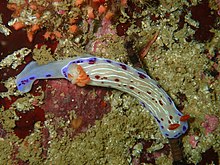Doridacea is a taxonomic grouping of dorid nudibranchs, shell-less marine gastropod mollusks.[1] included in the clade Euctenidiacea of the clade Nudibranchia.
| Doridacea | |
|---|---|

| |
| Hypselodoris | |
| Scientific classification | |
| Domain: | Eukaryota |
| Kingdom: | Animalia |
| Phylum: | Mollusca |
| Class: | Gastropoda |
| Order: | Nudibranchia |
| Suborder: | Doridina |
| Clade: | Doridacea |
| Superfamilies | |
|
See text. | |

Taxonomy
edit- Superfamily Doridoidea
- Family Dorididae
- Family Actinocyclidae
- Family Chromodorididae
- Family Discodorididae
- Superfamily Phyllidioidea
- Family Phyllidiidae
- Family Dendrodorididae
- Family Mandeliidae
- Superfamily Onchidoridoidea (= Phanerobranchiata Suctoria)
- Family Akiodorididae
- Family Calycidorididae
- Family Goniodorididae
- Family Onchidorididae
- Family Corambidae
- Superfamily Polyceroidea (= Phanerobranchiata Non Suctoria)
- Family Polyceridae
- Family Aegiridae - In Bouchet & Rocroi (2005) Aegiretidae is an incorrect subsequent spelling.
- Family Gymnodorididae
- Family Hexabranchidae
- Family Okadaiidae
Description
editNudibranchs in this grouping have a mantle which overlaps the sides of the foot, apart from the tail in some families. In the Superfamily Polyceroidea and the Family Goniodorididae this is often reduced to a ridge which may bear processes. There is usually a ring of external branched gills surrounding the anus towards the back of the body, but in some subgroups these gills can be located beneath the sides of the mantle (Family Phyllidiidae, Family Corambidae). Typically there are two rhinophores with lamellae which arise through the mantle towards the front of the animals.
References
edit- ^ Bouchet P. & Rocroi J.-P. (Ed.); Frýda J., Hausdorf B., Ponder W., Valdes A. & Warén A. 2005. Classification and nomenclator of gastropod families. Malacologia: International Journal of Malacology, 47(1-2). ConchBooks: Hackenheim, Germany. ISBN 3-925919-72-4. ISSN 0076-2997. 397 pp.